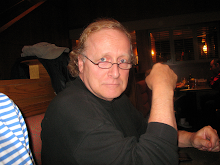For Yale’s Money Man, a Higher Calling - New York Times -- Here's a good read about a guy who revolutionized portfolio management in general by looking beyond the traditional mix of stocks and bonds, making Yale's endowment the standard against which all others are measured. The article also gives you a glimpse of the philosophy behind Yale, and an idea of why so many Yale graduates focus on quality of life issues and wind up in positions of public service. Around here, a cataloguing of Yalies who serve includes the Morrison brothers, Ed and Hunter; David Pogue; Sherrod Brown; and Oliver "Pudge" Henkel. On a national level, we have Garry Trudeau and Sir John Templeton, William F. Buckley and Bill Clinton, George Pataki, and the current president and his most recent competitor. It seems to be an interesting school, and Mr. Swenson has made it possible for everybody who qualifies to receive an education there. It's a long article, but take time to read the whole thing. Here's the section on the move to alternative investments:
Yale has every reason to want him to stay. After joining the university’s investment office when he was just 31, Mr. Swensen moved Yale’s portfolio away from a strict menu of stocks and bonds, favoring instead more diverse instruments like hedge funds, commodities like oil and timber, and private company investments.
That strategy revolutionized endowment investing, and other schools have followed suit. Mr. Swensen’s track record and his growing cachet have helped Yale attract donors who believe that their gifts to the university will be well deployed. Although his two books, “Pioneering Portfolio Management” and the more recent “Unconventional Success,” have helped raise his profile as an investment guru, he remains ambivalent about promoting himself. He notes that there are thousands of university professors who have also forgone more lucrative careers to put their skills to work in the academic world.
